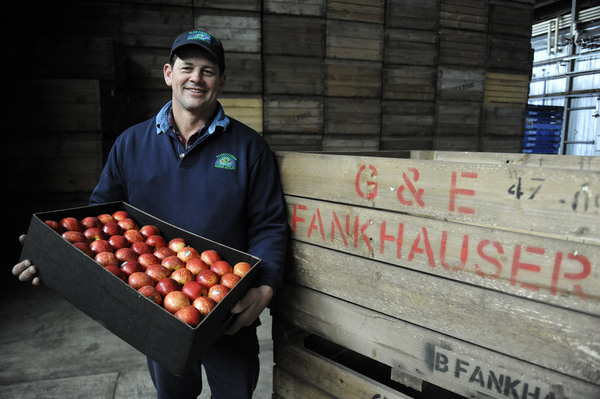Pushing the boundaries have paid off for Drouin apple grower BRAD FANKHAUSER. General manager of family business Fankhauser Apples, he recently won a major award for his use of modern technology in the management of the orchard. He shares his passion for the industry and hopes for the future with KATHRYN BERMINGHAM.
BRAD Fankhauser has both the past and the future in his sights.
The fourth generation orchardist has spent most of his life among the apple trees, passionately learning and refining the craft.
Yet his vision for the future is equally as impressive, remaining constantly at the forefront of orchard technology and a passionate advocate for pushing the industry forward.
He recently won the APAL Grower of the Year award for his use of technology in orchard management and for his role in supporting industry development.
Implementing modern technology into the operation of the orchard has produced exceptional results.
“We’re pushing boundaries now that we never thought we could push five years ago,” Brad said.
“This year, from one block of Gala we picked 82 to 83 tonnes – we never thought it was possible to get past 65 to 70.
The secret lies partly in the tree spacing and tree row volume and partly in the type of tree – a ‘slender spindle.’
“It’s a nice, slim tree with very consistent branches,” Brad said.
“We’re constantly evaluating the way we do things but I don’t think we’ve reached the boundaries of this system yet. We’ll keep pushing for a bit longer.”
The Fankhauser family moved onto its 25-hectare Drouin orchard in 1982 when Brad’s parents Glynn and Liz brought the property.
Brad’s wife Darlene and children Jacob, Isabelle and Oliver now live there too.
Glynn still has a major influence in the running of the orchard and he and Brad are now assisted by four permanent full time and four permanent part time staff.
During the harvest season another 30 casuals join the team.
“We pick from about the third week of February to the second week of May. That whole time everyone’s flat out picking.”
The apples picked during that period are then stored and distributed throughout the remainder of the year.
Approximately 90 per cent of all apples grown are sent to long-term storage.
“After it’s picked we decide whether the apple will go into long or short term storage, depending on the condition of the fruit.
“If it goes into short term, it will be sold within six weeks.”
Fruit chosen to be put into long-term storage is put into more than 2000 controlled atmosphere storage bins on the property.
“We treat the apples with a product called Smart Fresh which helps to control the ethylene production in the fruit.
“The oxygen is taken down to about 2.5 per cent and the carbon dioxide will be running at about 1.5 per cent, which, basically, puts the fruit into hibernation.”
If the process is carried out effectively it is almost impossible to tell the difference between an apple that has been freshly picked and one that has come out of storage.
“If it’s picked and stored correctly I would challenge anyone to find a difference, but if a piece of fruit is picked outside the parameters then it’s never going to be any good.”
The fruit is then progressively distributed as markets dictate.
“There’s more change in the industry now than we could have ever imagined 15 years ago. You could almost say we’ve turned the trees upside down.”
Fankhauser apples don’t deal directly with supermarkets, instead dealing with greengrocers including Nine Mile Fresh at Tynong and Montague’s at Narre Warren.
Though the fundamental values of the Fankhauser family business have remained true for decades, the apples continue to evolve.
The past few years have seen the Jazz apple take the industry by storm with the Fankhausers eager to perfect the popular taste.
“Jazz is bred between Gala and Braeburn – a Gala taste with a Braeburn crunch and longevity to it.”
Its sweet taste has paid dividends, with boxes attracting prices far higher than other varieties.
“It’s the only apple in Australia that’s getting $45 a box. There are numerous competitors getting $35 at the best of times.”
Jazz apples make up about a quarter of the apples grown by the Fankhausers. The other quarters are dominated by Royal Gala, Granny Smith and Pink Lady apples, with Fuji, Golden Delicious and Envy making up a smaller portion of the farm.
The Fankhausers have also bred their own variety – the Alvina Gala.
“We discovered the Alvina tree on the farm about 15 years ago. It was just a chance mutation that we got patented.”
Alvinas are red and are characterised by their ability to develop colour well before maturity.
Working out how many apples to plant and of what variety proves to be a complex equation.
“We try to meet consumer demand as much as possible.
“If you want a fruit that weighs 185 grams we will aim to put every apple in that category. We’ll be measuring the fruit weekly.”
A veteran of the industry, Brad is also heavily involved in fruit growing associations and support networks and is eager to share views and ideas.
He has an active role with Fruit Growers Victoria and Gippsland Fruitgrowers, displaying an evident passion for the profession.
“We need to jazz up our industry, we need to make it exciting. We struggle to get people to work in agriculture and we’ve got to start selling it better.”
He hopes new technology will assist the progression of the industry.
“The technology that’s involved in growing fruit is phenomenal and the industry is going through a period of real transformation.
“It’s a really exciting time.”












